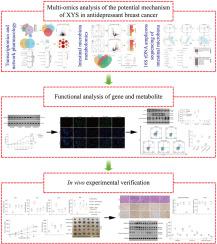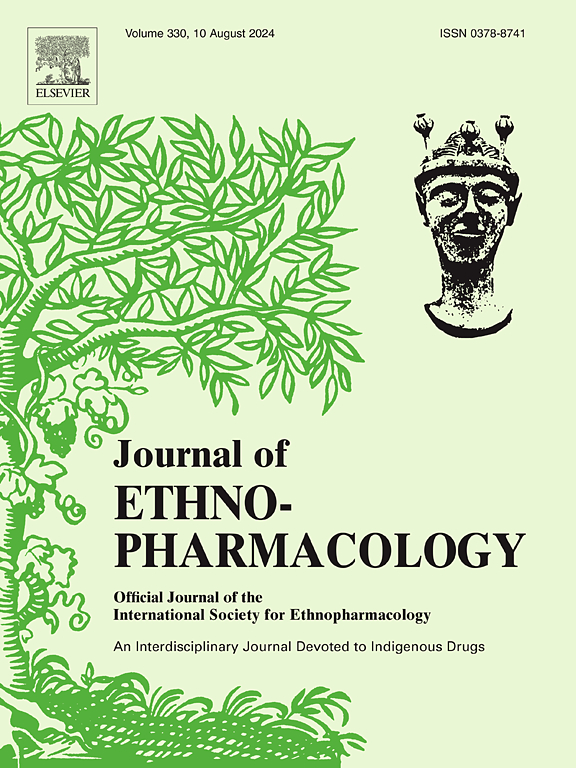逍遥散通过抑制肠道菌群谷氨酸水平逆转抑郁的促乳腺癌作用。
IF 5.4
2区 医学
Q1 CHEMISTRY, MEDICINAL
引用次数: 0
摘要
民族药理学相关性:逍遥散(XYS)是一种传统的中草药,用于舒缓肝脏和解决抑郁症,长期以来一直用于治疗抑郁症,最近显示出对乳腺癌的有希望的效果。然而,其对抗抑郁性乳腺癌的确切机制尚不清楚。研究目的:本研究旨在确定XYS逆转抑郁症乳腺癌的分子靶点,并阐明其潜在机制。材料和方法:行为学和组织病理学分析将用于验证XYS在慢性不可预测轻度应激(CUMS)模型中改善抑郁症乳腺癌的疗效。通过转录组学技术鉴定与抑郁性乳腺癌相关的差异表达基因,并利用网络药理学预测XYS的靶基因。此外,我们建立了假无菌小鼠模型来探索XYS干预的机制基础,并将肠道代谢组学与16S rDNA基因测序相结合来评估微生物群相关途径。结果:XYS在CUMS模型中显著逆转抑郁样行为和肿瘤生长促进作用。综上所述,转录组学数据和网络药理学预测结果表明,XYS可能通过调节谷氨酸受体信号通路来缓解抑郁症相关乳腺癌。另外的代谢组学和16S rDNA测序研究表明,XYS改变了抑郁症乳腺癌小鼠的谷氨酸代谢。此外,抗生素消除肠道菌群削弱了XYS治疗抑郁性乳腺癌的疗效。结论:XYS通过抑制肠道菌群谷氨酸水平对抑郁性乳腺癌具有潜在的治疗价值。本文章由计算机程序翻译,如有差异,请以英文原文为准。

Xiaoyao San reverses the pro-breast cancer effect of depression by inhibiting glutamate levels in intestinal flora
Ethnopharmacological relevance
Xiaoyao San (XYS), a traditional Chinese herbal remedy used to soothe the liver and resolve depression, has long been employed in the treatment of depression and has recently demonstrated promising effects against breast cancer. However, the exact mechanism of its action against depressive breast cancer remains unclear.
Aim of the study
This study aimed to identify the molecular targets of XYS responsible for reversing depressive breast cancer and to elucidate its underlying mechanisms.
Materials and methods
Behavioral and histopathological analyses will be used to validate the efficacy of XYS in ameliorating depressive breast cancer in chronic unpredictable mild stress (CUMS) models. The differentially expressed genes associated with depressive breast cancer were identified by transcriptomic technology, and network pharmacology was used to predict the target genes of XYS. Furthermore, a pseudogerm-free mouse model was established to explore the mechanistic basis of XYS intervention, and intestinal metabolomics was integrated with 16S rDNA gene sequencing to assess microbiota-related pathways.
Results
XYS significantly reversed depression-like behaviors and tumor growth-promoting effects in a CUMS model. Taken together, the results of the transcriptomic data and network pharmacology predictions indicate that XYS may alleviate depression-related breast cancer through modulation of the glutamate receptor signaling pathway. Additional metabolomics and 16S rDNA sequencing studies demonstrated that XYS altered glutamate metabolism in depressive breast cancer mice. Furthermore, the elimination of intestinal flora by antibiotics weakened the efficacy of XYS in the treatment of depressive breast cancer.
Conclusion
These findings suggest that XYS has potential therapeutic value for treating depressive breast cancer through inhibition of glutamate level within gut microbiota.
求助全文
通过发布文献求助,成功后即可免费获取论文全文。
去求助
来源期刊

Journal of ethnopharmacology
医学-全科医学与补充医学
CiteScore
10.30
自引率
5.60%
发文量
967
审稿时长
77 days
期刊介绍:
The Journal of Ethnopharmacology is dedicated to the exchange of information and understandings about people''s use of plants, fungi, animals, microorganisms and minerals and their biological and pharmacological effects based on the principles established through international conventions. Early people confronted with illness and disease, discovered a wealth of useful therapeutic agents in the plant and animal kingdoms. The empirical knowledge of these medicinal substances and their toxic potential was passed on by oral tradition and sometimes recorded in herbals and other texts on materia medica. Many valuable drugs of today (e.g., atropine, ephedrine, tubocurarine, digoxin, reserpine) came into use through the study of indigenous remedies. Chemists continue to use plant-derived drugs (e.g., morphine, taxol, physostigmine, quinidine, emetine) as prototypes in their attempts to develop more effective and less toxic medicinals.
 求助内容:
求助内容: 应助结果提醒方式:
应助结果提醒方式:


